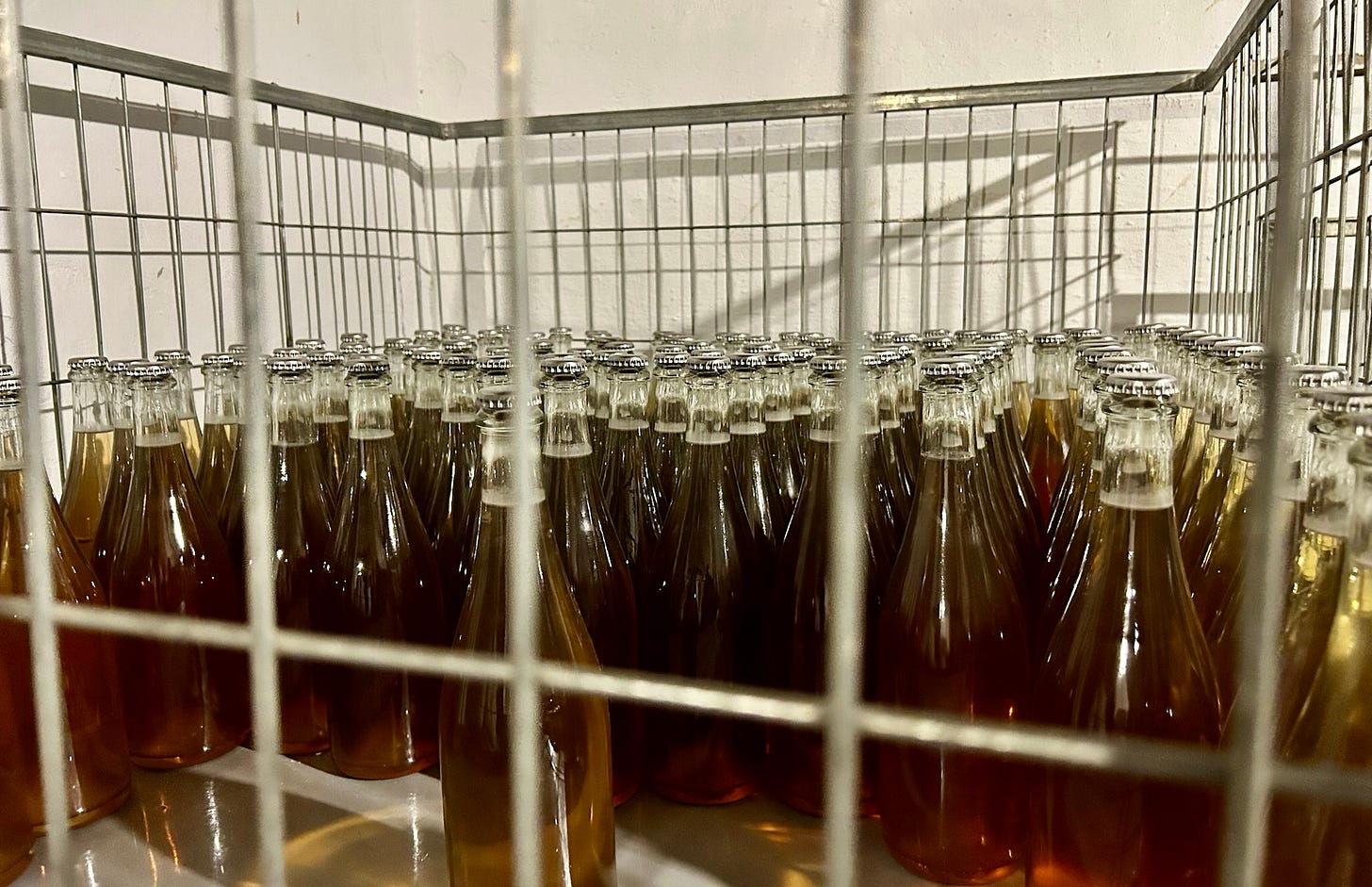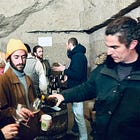Spend enough time with natural wine people, and you’re eventually going to be called out for sinning against some principle of the natural wine doctrine. At least, it will happen if you’re someone like me—someone who very much loves to drink natural wine…but perhaps not so much the Kool-Aid from the more cult-ish True Believer fringe of the movement.
This is a story of what can happen if you don’t drink the Kool-Aid. It takes place on a gorgeous, sunny afternoon in the town Sanlúcar de Barameda, in Andalusia, in southern Spain. Sanlúcar is well known as the place where manzanilla sherry is made. This story is not about sherry.
My travel companion and I began the day tasting incredible manzanilla out of the casks with a legendary sherry producer, who flamboyantly poured from his whip-like venencia. Then, we moved next door to a young, biodynamic winemaker who made non-fortified wine from palomino and moscatel. After visiting his vineyard, the biodynamic winemaker asked us to wear billowy hygenic foot coverings over our shoes in his cellar.
Finally, around Spanish lunch time (ie. late afternoon) we ended up at the home of a renowned natural winemaker. This guy greeted us warmly, but he’d been on a bender the night before and was a little hungover. As he put on a fresh shirt, he poured us a beer he’d made. “This is probably the only beer that has more wine than beer in it,” he said. Tanks and bottles crowded into the entry space of his home. He did not ask us to wear hygenic foot coverings.
Almost immediately, our natural winemaker launched into a rant. First, about the winemaker we’d just visited. “What is biodynamic anyway?” he said. “They can just buy the biodynamic preparations online.” This rant wasn’t surprising. There is possibly no group of people on earth who talk more shit about one another—behind one another’s back—than natural winemakers do. Plus, the biodynamic winemaker had already told us he’d once partnered with this guy and they’d had a “philosophical” falling out.
The rant quickly turned to sulfites, as natural winemaking rants so often do. “Sulfites are a poison and it’s killing people slowly like tobacco,” he said. “They should put sulfite labels on the bottle like tobacco.”
“What do you mean,” I asked. “Pictures of black lungs and dead babies like on cigarettes?”
“Yes, exactly.” The winemaker’s dog, who by now was sitting in my travel companion’s lap, was actually named Sinsulfitos. He popped open a pet-nat made from palomino that had been aged under flor, the blanket of yeast used in sherry making. It was damn good.
“Tell me a wine that’s better,” he said. I named a couple of other pet-nats from other natural producers. “Yeah but they use sulfites,” he replied. “I don’t consider it wine if you use sulfites. Don’t tell me about under 10 parts per million. You either add sulfites or you don’t. Mine is the only wine made in this area. In the other bodegas, they’re don’t make wine.”
Sulfites were the devil, couldn’t I see that? At this point in his career, our natural winemaker couldn’t even attend a natural wine fair anymore, because they allowed in too many wines with sulfites. Life on our burning planet, full of war and hunger and strife, would be immeasurably better if sulfites in wine were outlawed, he insisted.
He told us a story about the night before. He and his friends had a drinking party at the house, and someone had parked in the narrow alley in front of his door. At 2 a.m., the police showed up. The police wanted them to move the car, but they wouldn’t allow anyone in the group to drive because they suspected them to be drunk. “No, no,” our winemaker told the police. “There are no sulfites in this wine. We can drive.” The police gave the car owner a breathalyzer test. Of course, the friend passed the breathalyzer test even though he’d consumed multiple bottles of pet-nat.
When I expressed skepticism, he said, “Ah, but I can tell you like conventional wine.”
By this point, my travel companion—who works in a natural wine bar in Barcelona—was smitten. To be fair, I was somewhat smitten, as well. Who doesn’t love a handsome, charismatic Che Guevara-ish character?
I should stop here and say that I believe in the tenets of what has come to be called natural wine. Wine should be terroir-driven with little intervention. Grapes should be grown organically without chemical herbicides and pesticides, and they should be harvested by hand, not machine. Vineyards should be living, vibrant places with vegetation growing between the rows. There should be biodiversity of many grapes and not just a monoculture of market-friendly varieties. Wine should not be made by adding commercial yeasts, sugar, or any number of other additives that are allowed. Still, I’ve always thought of natural wine as more of a spectrum than a dogma. Some of my favorite winemakers are “natural” but reserve the right to intervene if a harvest goes sideways. For me, a tiny bit of SO2—just before bottling—is not worth getting cranked up about.
Still, I appreciate that plenty of natural wine people do not share my point of view. They believe in zero-zero, and that means no sulfites. This is a totally fine stance. I get it, respect it. In the face of relentlessly marketed, late-capitalist garbage, radical cultural movements need manifestos, hard-line arguments, fealty tests. As Mao once said: “Revolution is not a dinner party.”
But if I’m being honest, it also gets a little tiresome sometimes, as does being labeled hopelessly “conventional” if you don’t share the precise zero-zero philosophy. Our natural winemaker host seemed to sense the vibe, and so we gathered up several more bottles and went to a local bar to eat and drink. This was a classic Andalusian bar with walls full of bullfighting posters, and we were joined by a jovial group of friends who all worked in the local wine business.
Since it happened to be my travel companion’s birthday, things segued quickly from tasting to party. Jamón was eaten. Cigarettes were rolled and shared. Lots of wine was poured, and most of it was really good, particuarly the methode ancestral palomino. These were the kinds of wines that make Jerez a more exciting region than people realize.
But soon the wine ran out, and so we moved to another bar. Vermouth and beer followed. As the sun went down, I was getting worried about our half-hour drive back to Jerez and mostly stopped drinking, even though I kept being offered a steady stream of booze. A group of us returned to our natural winemaker’s home.
Though the ranting about evil sulfites had died down a little at the bar, back in the home winery it started up in earnest again. Sulfites! Yes we get it! Things then took a strange turn, as he opened another wine. This bottle he claimed was from a very special terroir. By now, our natural winemaker was drunk, and as he poured, he once again challenged me to name a better wine in the world.
I tasted the wine. It was flawed. It was honestly a bad wine. Normally, I would have just taken a mouthful, spit it, and moved on. But listening to five hours of natural-wine ranting and shit-talking caused something inside me, amid the mouse and volatile acidity, to snap. The winemaker goaded me again. “This is amazing, isn’t it?” he said. He can’t be serious, I thought.
And so I said: “This is a bad wine. And you know this is a bad wine. You know it has flaws.” And I dumped the remainder into an empty dump bucket.
The winemaker looked genuinely shocked. Who was this silly American in a light-blue polo shirt—this “conventional” wine drinker—standing in his winery, telling him that his wine was bad? “No, no, you’re wrong,” he said, raising his voice.
Fine, I said. I poured a little more in my glass, and tasted it again. “No, this is flawed wine,” I said, and again theatrically splashed the remainder in the bucket. This lit a fuse, and our natural winemaker—embodying his role as revolutionary—grabbed his dump bucket and threw the liquid at me. All over me, washing down like cold November rain. “You dump my wine, I dump it on you!” he shouted. I was so shocked, all I could do was laugh as I was dripping with flawed pet-nat. A little more harmless jawing ensued, and then luckily everyone calmed down. The winemaker and I hugged it out. (Note: this was a dump bucket, not a spit bucket; no one was spitting).
The party ended soon after. My travel companion passed out in the car as I drove through the Andalusian countryside, waking as we arrived into Jerez. It was only 10:00 pm, dinnertime in Spain, so we decided to eat some tapas along with a big-brand, definitely-not-natural fino sherry. She’d lived many years in Mexico and as we ate, she said, “You know, if we were in Mexico, that would have ended much worse.”
“Yeah,” I said. “In Philadelphia it would have ended badly, too.” I knew, fairly or unfairly, I had been the instigator. Maybe it was a badly ingrained Philly-area impulse. Maybe I had been bored by the hours-long ranting. In any case, I felt a little bad. I felt like I had betrayed natural wine—whatever that means.
A few days later, the winemaker sent me a message: “Ey Jason, sorry for throw the wine on you. I think you are a nice guy. Everyone has to look into themselves. Thank you for your visit.”
He’s right, after all. Everyone does have to look into themselves. We all define life and wine differently—natural or otherwise. A natural winemaker, trying to work within a strict set of virtues and principles, is fighting an underdog’s battle in a corporate wine world that would like to see wines like his eradicated. His defensiveness and reaction made all the sense in the world, and I respect it.







I think we share very similar philosophies on natural wine. I love it - and will defend it until I die - but I don't love the dogmatic approach that some winemakers / somms / wine trade have about it (although I agree with you that movements like these need the extremists to move the needle).
The thing that struck me most about this piece (other than the dude tipping wine over you - poor show!) was that the winemakers drank beer and vermouth at the bars. I've always found it interesting how the most dogmatic of natural wine people will happily glug mass produced lager by the gallon without a second thought. Which would be totally fine if they weren't so irritating about wine.
Brilliant!